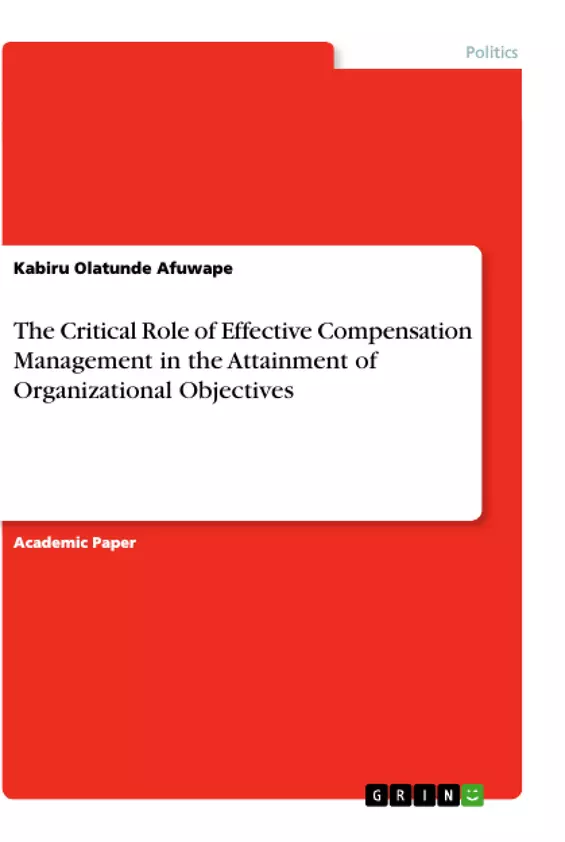This paper highlights the fact that not every employee values the same benefits, a potential solution is a flexible compensation program that allows each employee to choose customized benefits from a menu of options known as cafeteria benefits. To derive ultimate benefit from their employees, each organization should realize that there is no "one size fits all". Each organization should strive to achieve the best mix depending on its strategic objectives.
Inhaltsverzeichnis (Table of Contents)
- INTRODUCTION
- DISCUSSIONS
- Compensation as a Systematic Approach
- Compensation Package Components
- Determining Effective Compensation Package
- Individual Incentives
- Group Incentives
- Organisational Competitive Strategy and Compensation Package
- CONCLUSION
Zielsetzung und Themenschwerpunkte (Objectives and Key Themes)
This assignment explores the critical role of effective compensation management in achieving organisational objectives. It delves into the principles and practices of compensation management, highlighting its importance in motivating employees and aligning their contributions with organizational goals.
- The relationship between compensation management and employee motivation
- The impact of compensation strategies on organizational performance
- The importance of aligning compensation practices with broader HR strategies
- Different types of compensation packages and their effectiveness
- The role of organizational competitive strategy in shaping compensation policies
Zusammenfassung der Kapitel (Chapter Summaries)
- Introduction: This section introduces the concept of Human Resource Management (HRM) and emphasizes the strategic importance of compensation management as a key motivational factor for employees. It highlights the role of motivation theories in understanding employee needs and desires.
- Discussions: This section delves into the various aspects of compensation management, including its definition, components, and key determinants. It examines different approaches to determining effective compensation packages, considering factors such as pay surveys, pay level strategies, and job-based or skill-based compensation. The section further explores individual and group incentives, highlighting their impact on employee performance and teamwork. It concludes by discussing the influence of organizational competitive strategy on compensation packages and the importance of aligning compensation practices with broader HR strategies.
Schlüsselwörter (Keywords)
Key terms and concepts include: compensation management, employee motivation, organizational objectives, pay surveys, pay level strategies, job-based compensation, skill-based compensation, individual incentives, group incentives, organizational competitive strategy, HR strategy, and flexible compensation programs.
Frequently Asked Questions
What is the main goal of effective compensation management?
The main goal is to motivate employees and align their individual contributions with organizational strategic objectives to enhance overall performance.
What are "cafeteria benefits" in compensation programs?
Cafeteria benefits are flexible compensation programs that allow employees to choose customized benefits from a menu of options, acknowledging that different employees value different perks.
How do individual and group incentives differ?
Individual incentives focus on personal performance, while group incentives are designed to foster teamwork and collective achievement within a department or the whole organization.
Why is there no "one size fits all" in compensation?
Each organization has unique strategic goals and a diverse workforce; therefore, the compensation mix must be tailored to the specific competitive strategy and employee needs.
What role do pay surveys play in determining compensation?
Pay surveys help organizations stay competitive by providing data on market rates, allowing them to set appropriate pay level strategies to attract and retain talent.
- Quote paper
- Kabiru Olatunde Afuwape (Author), 2015, The Critical Role of Effective Compensation Management in the Attainment of Organizational Objectives, Munich, GRIN Verlag, https://www.grin.com/document/1222659



